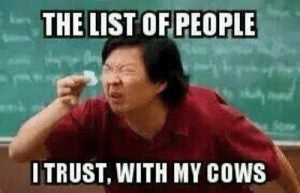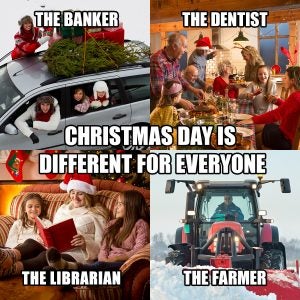Farming is considered one of the world’s most dangerous jobs, and for good reason! Whether running heavy machinery or sorting 1,200+ pound critters, it is very hard work that isn’t for the faint of heart. While there are many similarities between crop farms and livestock folks, there also are some different challenges and unique experiences. Here are the top nine differences:
1. Weather — can’t be in fields! In livestock farming, the farmer isn’t controlled by Mother Nature. Even in a downpour or snowstorm, the pens need to be cleaned and scraped, and livestock need to be fed and cared for. If you had hoped to be in the fields, well, your work is delayed. You can’t be in the fields in the rain!
2. Are you sick? Tough beans — there are no sick days, and the cows must still be milked. In crop farming, it’s most likely not the end of the world, but for livestock, if you aren’t there to assist a complicated birth, it could be a matter of life or death. There are so many circumstances that can go wrong with living creatures. Another problem can be labor shortages. It can be very hard to find good help from people you trust and who know your animals as well as you do. There is never a day off with livestock.

3. Physical strength. I laugh and admire my man when he makes wrangling a 250-pound sheep look easy. Farming usually requires the help of the whole family, particularly when doing a ton of heavy lifting involved with livestock. I consider myself somewhat strong, but he looks like the Incredible Hulk when carrying, hauling, or lifting items like feed buckets, heavy gates, and moving the animals. The strength is admirable, and required!
4. Nerve wracking weather can quickly rob your yields! A crop farmer’s livelihood is very dependent on the weather, unlike with livestock. In the case of tornados, hurricanes, severe flooding, frost, or drought, some farmers’ yields can literally drop to zero, thus ruining your entire crop year. Weather affects livestock, too, but it’s not nearly as volatile as it is for crops.
5. Market price variables. The market price for crop farming changes, but for livestock, farmers have to deal with both market price of the livestock and for the price of feed. For example, if the price of corn goes up and price of cattle goes down, farmers could potentially lose a lot of money, which can sometimes sadly run them out of business when they can no longer afford to feed or sell them.
6. Different equipment. Crop farmers usually have to spend big bucks on equipment like combines, sprayers, and tractors, where livestock farmers have to spend money on equipment like feeders, manure spreaders, trailers, and hay equipment, just to name a few.
7. Holiday and special-event delays. With livestock, the animals’ needs always come first. If there’s a special event or holiday, it is not uncommon to be late or have to rearrange your schedule to try to balance it and fit everything in. It may be Christmas morning, but the cows must be milked before you open presents!

8. Is it zero degrees outside? While crop farmers certainly can’t tend to their crops in the snow, livestock are still being born in every weather condition. Even in a blizzard, the newborn lambs still need you at all hours of the night.
9. Livestock farmers can’t store their commodities. While the market price changes daily, crop farmers can store their grain for a long time and sell when the market price gets better. For livestock, when the animal is fat, it’s time to be sold regardless of how good the price is. This especially rings true for dairy! There are many variables that are out of their control.
Some farmers choose livestock or crops. Some choose both. It’s always important to diversify so if one aspect of the farm has a bad year, hopefully the other aspect will be good and balance it out overall. We are lucky — with several different row crops, beef cattle and sheep — we get the burden and excitement of both worlds.
Michelle Miller, the Farm Babe, is an Iowa-based farmer, public speaker and writer, who lives and works with her boyfriend on their farm which consists of row crops, beef cattle, and sheep. She believes education is key in bridging the gap between farmers and consumers.



